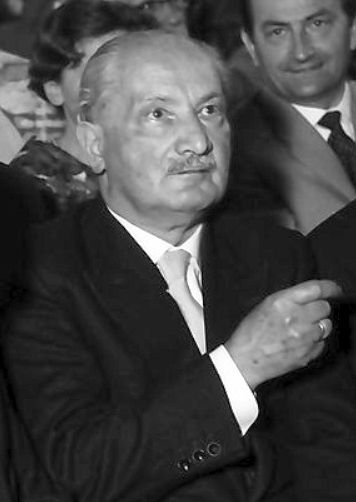Martin Heidegger citations célèbres
“Ce n’est pas par des paroles que s’engagent les décisions, mais seulement par le travail.”
Qu’est-ce qu’une chose, 1962
Citations de la pensée de Martin Heidegger
, 2013
, 1946
I see the situation of man in the world of planetary technicity not as an inexitricable and inescapable destiny, but I see the task of thought precisely in this, that within its own limits it helps man as such achieve a satisfactory relationship to the essence of technicity. National Socialism did indeed go in this direction. Those people, however, were far too poorly equipped for thought to arrive at a really explicit relationship to what is happening today and has been underway for the past 300 years.
en
Interview recueilli en 1966 sous la condition d'une publication posthume, qui fut réalisée en 1976 par Der Spiegel .
Interview du Spiegel, 1966
Martin Heidegger Citations
“Le pur et simple passé n’épuise pas ce qui a été. Ce qui a été continue d’être […].”
Qu’est-ce qu’une chose, 1962
sérénité
Questions III et IV
“La philosophie compte parmi les plus originels des efforts humains.”
Qu’est-ce qu’une chose, 1962
“Le repos n’est que mouvement se retenant en soi, souvent plus inquiétant que le mouvement même.”
Qu’est-ce qu’une chose, 1962
Being and Time
Martin Heidegger: Citations en anglais
Four Lectures on Technology (1949)
“The human body is essentially something other than an animal organism.”
Letter on Humanism (1947)
Source: Nietzsche (1961), p. 50
...der Wille zur »wahren Welt« im Sinne Platons und des Christentums … ist in Wahrheit ein Neinsagen zu unserer hiesigen Welt, in der gerade die Kunst heimisch ist.
Source: Nietzsche (1961), p. 74
Source: Nietzsche (1961), p. 18
“Language is the house of the truth of Being.”
Letter on Humanism (1947)
“Death is the possibility of the absolute impossibility of Dasein.”
Der Tod ist die Möglichkeit der schlechthinnigen Daseinsunmöglichkeit.
Macquarrie & Robinson translation
Being and Time (1927)
Source: Nietzsche (1961), p. 5
Gesamtausgabe, 20:376, as translated by David Farrell Krell in Portraits of American Continental Philosophers (1999), p. 101
“Being is only Being for Dasein”
Macquarrie & Robinson translation
Being and Time (1927)
Source: Nietzsche (1961), p. 125
“Enjoyment of the work consists in participation in the creative state of the artist.”
Source: Nietzsche (1961), p. 117
Interview (23 September 1966), published posthumously in Der Spiegel (31 May 1976), as translated by Maria P. Alter and John D. Caputo in The Heidegger Controversy : A Critical Reader (1991), edited by Richard Wolin.
VIII, 89
p. 32
Nietzsche (1961)
Source: Nietzsche (1961), p. 117
“The word “art” does not designate the concept of a mere eventuality; it is a concept of rank.”
Source: Nietzsche (1961), p. 125
Source: Nietzsche (1961), p. 26
“In everything well known something worthy of thought still lurks.”
Source: Nietzsche (1961), p. xxxix
Interview (23 September 1966), published posthumously in Der Spiegel (31 May 1976), as translated by William Richardson in Risk and Meaning, Nicolas Bouleau (translated by Dené Oglesby and Martin Crossley), ed. Springer, 2011 ISBN 978-3-642-17646-3, page 102.
“In order to remain silent Da-sein must have something to say.”
Stambaugh translation
Being and Time (1927)
Introduction to Metaphysics (1953) — a publication of lectures of 1935.
